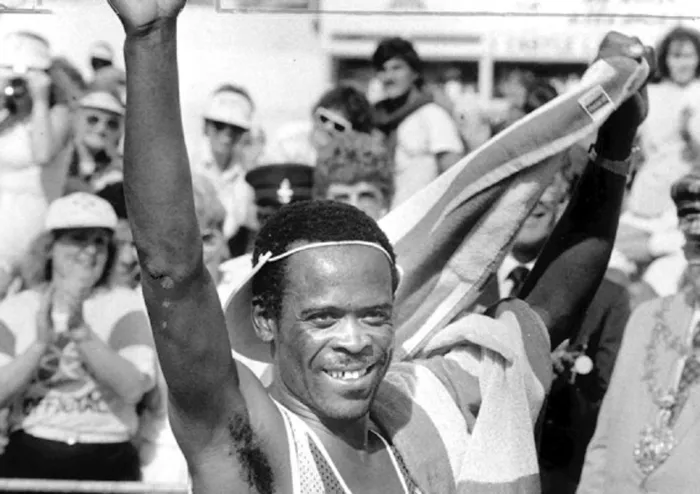50-year milestone for black and women Comrades

Sam Tshabalala during his groundbreaking victory in 1989.
Durban — In 1899, 13-year-old Vic Clapham enrolled as an ambulance volunteer, and did duty in the Anglo-Boer War.
Years later, as a World War I veteran, Clapham got permission to stage the first Comrades Marathon from Pietermaritzburg to Durban, in honour of the soldiers who perished in the Great War.
Little did Clapham realise that the race, which began in 1921 with 34 runners, would morph into an internationally revered ultra marathon and provide a degree of healing to some of the country’s long-running race and gender biases. About 20 000 runners are expected for this year’s up-run on June 9, and will mark 50 years since black runners and women were permitted entry into this race.
Just as Clapham persistently challenged the decision makers to get approval for the race, the same was required from outspoken individuals in the early 1970s for Comrades to become an all-encompassing event.
The gradient of opposition the forward-thinkers had to negotiate for the sake of parity was steep and consistent with the political atmosphere back then.

Robert Mtshali ran the Comrades in 1935 but was not recognised as the race’s first black runner, nor was his run of 9 hours and 30 minutes regarded as official. Mtshali was only honoured in 2019 by race’s commissioners with one of the Comrades medals named after him. A Daily News article on June 4, 1973 gave some insight into how the tradition of keeping black runners out of the Comrades was being maintained.
John Morrision, a Comrades veteran from Pietermaritzburg bucked that trend.
He presented medals to two black runners in 1973, whose efforts in completing the race was also regarded as unofficial.
Morrison had collected eight donated medals (seven silver and a gold) from former runners and presented gold to Zwelitsha Gono, a 21-year-old student from Richmond, who was the first black finisher in 1973.
The gold medal belonged to Harry Pitman, the former Natal Progressive Party leader.

Simon Mkhize from Howick finished behind Gono and received a silver medal from Morrison, who also seconded him along the way.
Morrison told the newspaper that he was sick of the attitude of the race’s organisers, who classified black Comrades participants as “unofficial” runners.
He was also incensed that the Comrades authorities steadfastly maintained the race was a local club event when it had entrants from England and New Zealand.
“The marathon was one of the greatest road races in the world and I think it is a disgrace that non-whites are not regarded as official participants.
“If Dr (Piet) Koornhof, the Minister of Sport, can say that it could be an open event, then I can’t see why Comrades officials are adopting a negative attitude,” Morrison commented.
Days before in the Daily News (May 31, 1973), a Comrades official responded to suggestions that if they applied for the race to be multiracial, the government would consider it.
The official said it would not be considered because it would be flouting the government's policy on integrated sports participation, a bigger field than the 1600 runners in 1973 race would create “massive organisational problems”.
“What would we do if we found another 500 non-whites running?”.
“The Comrades is a club event and all arrangements are made to this level. That’s all there is to it,” he said.
The government’s endorsement of a multiracial Comrades was regarded by some as their veiled attempt to curry favour for South Africa’s readmission into the Olympic and other sporting folds.
After canvassing their members, early in 1975, College Harriers, a Pietermaritzburg-based athletics club, approached the Natal Athletics Association about opening the race to a limited black runners.
That motivation was endorsed in a statement from the South African Amateur Athletics Union, which confirmed that blacks and women could compete in 1975, the number of runners would be restricted and certain qualifying criteria was instituted.
The qualifying process was a challenge for black runners because they had fewer races opportunities to do so.
Of the 1 501 entries, 1 352 runners arrived for the race and 1 237 finished the race.
Mkhize, a 1975 finisher, was regarded as a pioneer for black runners and was awarded retrospectively for his previous finishes that were not recognised.
He became the first black runner to achieve a “green number” for his 10 finishes and later a “double green” for his 20 finishes, which includes eight silver medals.
Mkhize also became the first black person to finish the Dusi Canoe Marathon and mountain climbing was his other extreme sport interest.
Little-known Sam Tshabalala, a railway worker from the Free State, won the Comrades in 1989 and became the first black runner to do so.

Elizabeth “Betty” Cavanagh was also an inspiration to many as she became the Comrades first official women’s winner in 1975.
Cavanagh and Mavis Hutchinson were the only starters in their section. Hutchinson dropped off somewhere after the halfway mark.
The 44-year-old Cavanagh completed the 1975 race in 10 hours and 8 minutes, having previously run as an unofficial runner.
Gear for the race was a challenge for Cavanagh as running kits in those days were made for men.
Undeterred, she sewed her own shirts and shorts.

Isaac Ngwenya, a Comrades board member, and head of their Heritage and Traditions Committee, who completed the race 22 times, said he was “excited” about this year’s race.
“Comrades will have its own road for the first time, ‘Comrades Road’ (formerly Connaught Road, Scottsville).
“The 50-year milestone is a great achievement.
“What saddens me is that 50 years on and 30 years of democracy, black people are still being marginalised in our structures.
“It is a big elephant in the room. Transformation has not been fully achieved,” he said.
Sunday Tribune
Related Topics: